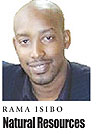In Africa, we have seen, over a number of decades that mineral wealth is often a curse, instead of the blessing it should be. There are a number of factors that cause this but the main factor can be explained in a simple allegory.


In Africa, we have seen, over a number of decades that mineral wealth is often a curse, instead of the blessing it should be. There are a number of factors that cause this but the main factor can be explained in a simple allegory.
Two people see a car, the first one thinks to himself "Wow if I have that car, then everyone will think I am cool, and all the girls will like me.”
However, the second man thought "I have tomatoes, now I will be able to take my tomatoes direct to the market and get more profit.”
One saw it as the ends, the other saw it as the means to an end. A Ugandan friend of mine recently asked me what could be done to prevent Uganda going the way of other oil-rich African states like Nigeria.
The answer is to have a wider goal, and using this mineral wealth to achieve that wider goal; Norway discovered oil and gas but used the money to fund a comprehensive social welfare fund.
Likewise in Rwanda, we view the potential riches of the Kivu methane as merely a means of achieving Vision 2020 and not the end in itself.
The second most important factor in making minerals viable for our future is to have political and social institutions that are accountable. Nigeria is the 7th largest producer of oil and yet makes less money than Colombia which produces much oil less than Nigeria.
This is because corrupt officials collude with multinationals to smuggle oil onto the black market, and thus keep the profits for themselves.
The third factor is the most important, we have to produce and consume our own minerals. We need to connect with each other, Congo imports oil from the middle-east, but Angola next door exports mainly to China.
The oil in Uganda has to power the East African industrial revolution and not just be exported to West markets with the money going in Swiss bank accounts.
We Africans have never known the true value of the minerals we have, we have just seen them as an alternative to agriculture, so we have the phenomenon of "subsistence mining” where whole areas of Eastern Congo have suffered from lawlessness and the locals dig valuable minerals just to get a daily meal.
We do not know the value of our minerals because we have no use for them, so a Congolese man can hand over a 9-carat diamond for a plate of ugali and isombe. Whenever NASA launches a spaceship, we must remember that all the minerals necessary can be found in or came from Congo.
So to avoid the curse of wealth we need to: have a higher purpose and view it as a means, have accountable institutions to manage this wealth, we need to have a practical use for these minerals, then we can know their value, but above all – it has to drive our own development.
The author is a regular columnist


